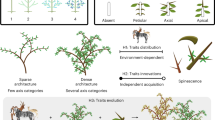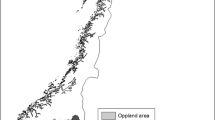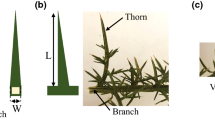Abstract
Descriptive and experimental evidence suggests that spine length is an inducible defense, with longer spines being produced by branches experiencing greater levels of herbivory. Here we present results from a replicated, controlled herbivore exclusion experiment in which cattle, wildlife (large mammalian herbivores), and megaherbivores (elephants and giraffes) were independently manipulated. Experimental wildlife barriers virtually eliminated herbivory on Acacia drepanolobium branches at all heights. Megaherbivore barriers reduced herbivory on branches more than 1.75 m from the ground by up to 80%, and reduced herbivory on lower branches by 40%. These patterns of herbivory were matched by patterns of relaxation of spine length that occurred in response to the treatments. After 22 months of herbivore exclusion, the lengths of newly produced spines were 19% shorter on branches protected from large mammal herbivory than on trees in control plots. On low branches, there was a steady increase in spine length from total exclusion plots (shortest spines) to plots with wildlife to plots with both megaherbivores and wildlife (longest spines). On higher branches, new spines were shorter in total exclusion plots and wildlife plots than in plots in which megaherbivores were allowed. This is the first replicated, controlled experimental demonstration that browsing by free-ranging herbivores is associated with greater spine lengths. Examination of trees incidentally protected from herbivory for several years suggests that reduction in spine length in the experimental plots will eventually exceed 70%. Initially slow relaxation of spine length may represent a cautious adaptive strategy in an environment where a given branch is likely to escape herbivory in a given growth season, even when herbivores are present.
Similar content being viewed by others
Author information
Authors and Affiliations
Additional information
Received: 29 September 1997 / Accepted: 26 February 1998
Rights and permissions
About this article
Cite this article
Young, T., Okello, B. Relaxation of an induced defense after exclusion of herbivores: spines on Acacia drepanolobium . Oecologia 115, 508–513 (1998). https://doi.org/10.1007/s004420050548
Issue Date:
DOI: https://doi.org/10.1007/s004420050548




